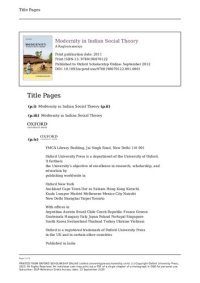
Ebook: Modernity in Indian Social Theory
Author: A Raghuramaraju
- Tags: India society social theory modernity nationalism secularism Dalits Gopal Guru Partha Chatterjee Javeed Alam
- Year: 2011
- Publisher: Oxford University Press
- Edition: 1
- Language: English
- pdf
This volume revisits the question and concept of modernity in Indian social theory and how this reading could be used to understand contemporary Indian society and texts. It discusses the limitations surrounding Indian social theorists' discussion of Indian society. The book focuses on
specific seminal accounts like that of Partha Chatterjee on Indian nationalism, Javeed Alam on the reading of Indian secularism, and Gopal Guru on the Dalit lived experience. Subsequent chapters critically examine the writings of key thinkers including Vivekananda, Aurobindo, Gandhi, and Ambedkar.
Abstract: Indian society is extremely complex, particularly in the twentieth century. However, this complexity has not been captured by Indian social theory. One reason is the theoretical burden caused by historical events such as colonialism, which incidentally brought modernity to India. Western modernity is mainly normative, and its norms include the concept of autonomous individual, freedom, and instrumental rationality. This normative project is sought to be ruthlessly implemented through modern programmes of secularism, nationalism, urbanization, and industrialization where the pre-modern is sought to be disinherited. This book explores the limitations surrounding Indian social theorists' views on Indian society. It discusses Partha Chatterjee's perspectives on Indian nationalism, Javeed Alam's interpretation of Indian secularism and the use of plural character of Indian society by some Indian social scientists, and Gopal Guru's proposal to move Dalits' lived experience from literature into social theory. The book also examines the limitations surrounding the reading of contemporary texts and activities of thinkers such as Mahatma Gandhi, Swami Vivekananda, B.R. Ambedkar, and Aurobindo Ghosh.
specific seminal accounts like that of Partha Chatterjee on Indian nationalism, Javeed Alam on the reading of Indian secularism, and Gopal Guru on the Dalit lived experience. Subsequent chapters critically examine the writings of key thinkers including Vivekananda, Aurobindo, Gandhi, and Ambedkar.
Abstract: Indian society is extremely complex, particularly in the twentieth century. However, this complexity has not been captured by Indian social theory. One reason is the theoretical burden caused by historical events such as colonialism, which incidentally brought modernity to India. Western modernity is mainly normative, and its norms include the concept of autonomous individual, freedom, and instrumental rationality. This normative project is sought to be ruthlessly implemented through modern programmes of secularism, nationalism, urbanization, and industrialization where the pre-modern is sought to be disinherited. This book explores the limitations surrounding Indian social theorists' views on Indian society. It discusses Partha Chatterjee's perspectives on Indian nationalism, Javeed Alam's interpretation of Indian secularism and the use of plural character of Indian society by some Indian social scientists, and Gopal Guru's proposal to move Dalits' lived experience from literature into social theory. The book also examines the limitations surrounding the reading of contemporary texts and activities of thinkers such as Mahatma Gandhi, Swami Vivekananda, B.R. Ambedkar, and Aurobindo Ghosh.
Download the book Modernity in Indian Social Theory for free or read online
Continue reading on any device:

Last viewed books
Related books
{related-news}
Comments (0)